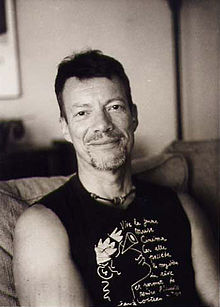Fenton Johnson
American novelist
John Fenton Johnson (born October 25, 1953) was born ninth of nine children into a Kentucky whiskey-making family with a strong storytelling tradition. His most recent book Keeping Faith: A Skeptic's Journey draws on time spent living as a member of the monastic communities of the Trappist Abbey of Gethsemani in Kentucky and the San Francisco Zen Center.

| This article on an author is a stub. You can help out with Wikiquote by expanding it! |
Quotes
edit"Going it alone" (2015)
editHarper's Magazine, April 2015, pp. 31-40
- "The free man ... believes in destiny and believes that it has need of him," wrote Martin Buber, the great Jewish philosopher. "Destiny," added Marianne Moore, the spinster poet, when she quoted Buber. "Not fate." What is this distinction Moore takes such care to draw between destiny and fate?
- Fate suggests submission to the circumstances of life; destiny suggests active engagement. The former implies some all-powerful force or figure to whose will we must submit. The latter implies that each of us is a manifestation of one of the infinite aspects of creation, whose fullest expression depends in some small but necessary way on our day-to-day, moment-to-moment decisions.
- We are caught — trapped, some might say — in the web of fate, but we are each just as surely among its multitude of spinners. In our spinning lies our hope; in our spinning lies our destiny.
- Counter to the avalanche of messages from our culture, I recognize celibacy not as negation but as a joyous turning inward. “Inebriate of air am I, / And debauchee of dew,” wrote Emily Dickinson, most promiscuous of celibates. “Opulence in asceticism,” Marianne Moore wrote, a phrase that celebrates the solitary life even as it provides a sound bite for saving the planet.
- The word "restraint" implies the asking of an essential question, one that is more important now than ever, and is antithetical both to capitalism and to science as we practice them: Because we can do something, must we do it?